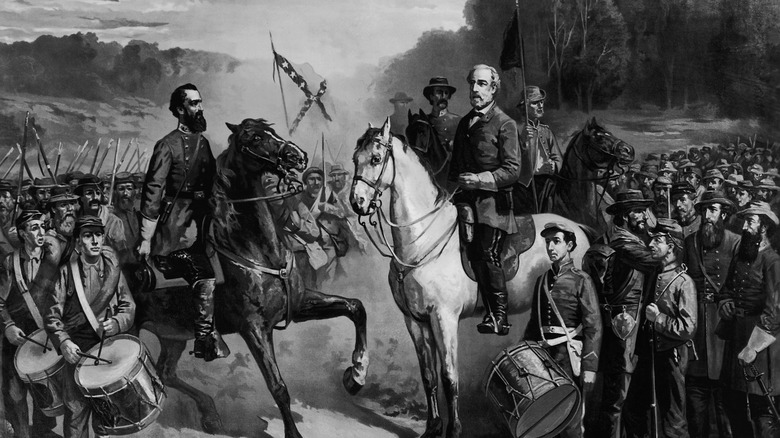Tipping Restaurant Workers Has Complicated Origins (And It's Still Controversial Today)
Tipping is generally regarded as a necessary evil in American restaurant culture; since servers typically make all their money off tips, it's generally never okay to stiff them. But it's not like either customers (who have to pay extra) or servers (who have to rely on unpredictable tipping income) love the practice. As inflation has risen over time and wages haven't kept pace, the tipping percentage continues to get higher, ultimately serving neither customers nor servers. Only one group served by using tips as a substitute for pay: business owners. As it turns out, this group was the one whom tipping was intended to serve from the very beginning, and the history of tipping is far more troubling than that.
It wasn't just that tipping was created as a means of exploiting workers; it was explicitly created to exploit former enslaved persons in the Reconstruction Era American South. It was a way for former enslavers who used to benefit from free labor to continue to do so — only now were they offloading the new costs onto customers. While it might be a stretch to say tipping is a form of servitude in modern America, its establishment as a result of the legacy of slavery isn't in question.
Tipping directly stemmed from slavery
It may be lore that tipping has some acronym-based meaning like "To Insure Promptness," but its origins are anything but mysterious. Tipping began as an outcropping of serfdom, where masters would tip servants for exceptional work. In the mid-1800s, there was a vacation-based tipping transfer between Europe and America — either from Americans discovering the practice in Europe and bringing it home or Europeans on holiday in America importing it. But it wasn't until the end of the Civil War — and with it, the end of slavery — that tipping became widespread rather than an affectation of the wealthy elite.
The end of the Civil War resulted in an influx of freed former enslaved persons to the paid labor market, and the restaurant industry was one of the few professions that didn't bar them from entry. However, with the sudden popularity of tipping among some customers, restaurant owners in the states that had been home to enslaved individuals sensed an opportunity to keep benefitting from free labor, as many had before the war. The Reconstruction Era didn't feature a minimum wage; it wasn't until 1912 that any state put a minimum wage into practice, and a national minimum wage wasn't established until the Fair Labor Standards Act of 1938.
As a result, it was perfectly legal for restaurant owners to offer little-to-no paid wages to their newly freed Black employees, instead forcing them to rely on tips for their continued survival. Though there was no shortage of anti-tipping sentiment in the United States, the practice still eventually spread throughout the country.
Tipping's negative legacy can still be felt today
Though the creation of the minimum wage in 1938 put a crimp in restaurant owners' ability to exploit workers, they didn't simply accept this as the status quo. Their efforts to lobby for legal exploitation never went away. In 1966, they succeeded in getting Congress to establish a sub-minimum wage designed to allow them to partially shift all servers' wages onto the customer, just as they once had for Black workers — who, as always, got hit the hardest.
Tipping's legacy has continued to this day; studies have long shown that Black restaurant servers make less in tips (regardless of the customers' own race) than their white counterparts. This was particularly bad during the COVID-19 pandemic when Black servers reported their tips declining at higher rates than their coworkers. Though these tendencies seem to be primarily the result of subconscious rather than overt racism, they're still a legacy of how tipping originally got its start.
Happily, efforts to eliminate the sub-minimum wage have proceeded rapidly in recent years, with numerous states, along with large municipalities like Chicago, moving to abolish it (along with another handful that never had it to begin with). Additionally, numerous restaurants have decided to ban tipping of their own accord. Though these efforts affect all servers, they particularly affect the Black restaurant employees against whom tipping currently discriminates and whom it was established to exploit in the first place.


